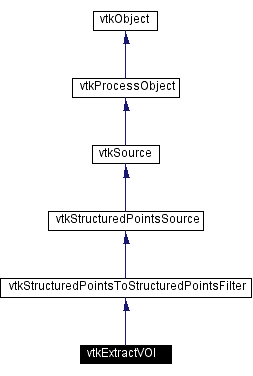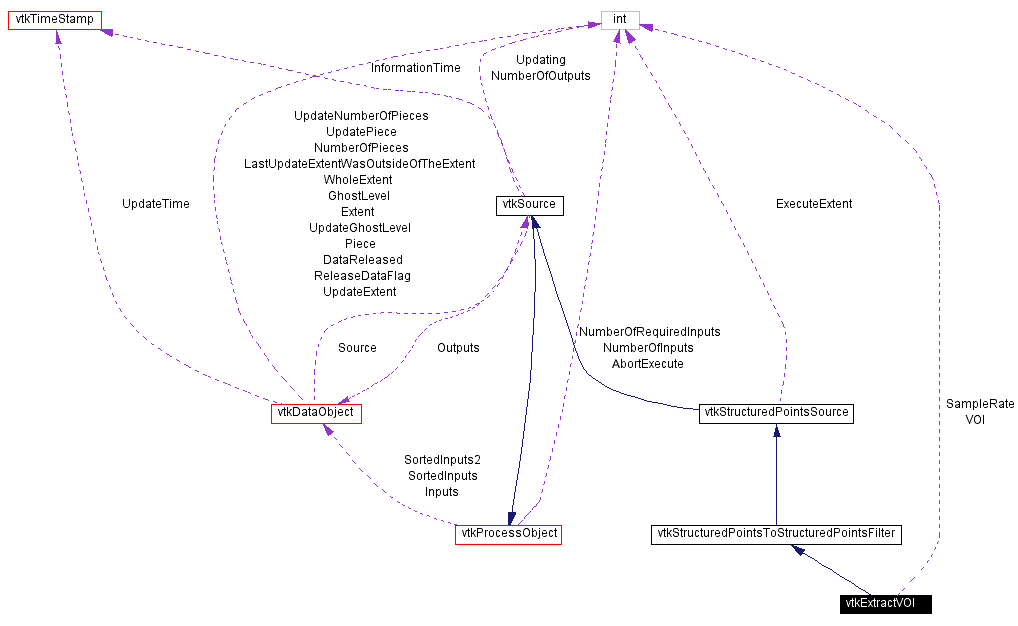Main Page Class Hierarchy Alphabetical List Compound List File List Compound Members File Members Related Pages
vtkExtractVOI Class Reference
select piece (e.g., volume of interest) and/or subsample structured points dataset.
More...
#include <vtkExtractVOI.h>
Inheritance diagram for vtkExtractVOI:
 [legend]Collaboration diagram for vtkExtractVOI:
[legend]Collaboration diagram for vtkExtractVOI: [legend]List of all members.
[legend]List of all members.
Detailed Description
select piece (e.g., volume of interest) and/or subsample structured points dataset.
-
Date:
-
2000/12/10 20:08:37
-
Revision:
-
1.24
vtkExtractVOI is a filter that selects a portion of an input structured points dataset, or subsamples an input dataset. (The selected portion of interested is referred to as the Volume Of Interest, or VOI.) The output of this filter is a structured points dataset. The filter treats input data of any topological dimension (i.e., point, line, image, or volume) and can generate output data of any topological dimension.
To use this filter set the VOI ivar which are i-j-k min/max indices that specify a rectangular region in the data. (Note that these are 0-offset.) You can also specify a sampling rate to subsample the data.
Typical applications of this filter are to extract a slice from a volume for image processing, subsampling large volumes to reduce data size, or extracting regions of a volume with interesting data.
-
See also:
-
vtkGeometryFilter vtkExtractGeometry vtkExtractGrid
-
Examples:
-
vtkExtractVOI (examples)
Definition at line 73 of file vtkExtractVOI.h.
Constructor & Destructor Documentation
| vtkExtractVOI::vtkExtractVOI |
( |
|
) |
[protected] |
|
| vtkExtractVOI::~vtkExtractVOI |
( |
|
) |
[inline, protected] |
|
| vtkExtractVOI::vtkExtractVOI |
( |
const vtkExtractVOI & |
|
) |
[inline, protected] |
|
Member Function Documentation
| virtual const char* vtkExtractVOI::GetClassName |
( |
|
) |
[virtual] |
|
| int vtkExtractVOI::IsTypeOf |
( |
const char * |
type |
) |
[static] |
|
| virtual int vtkExtractVOI::IsA |
( |
const char * |
type |
) |
[virtual] |
|
| vtkExtractVOI* vtkExtractVOI::SafeDownCast |
( |
vtkObject * |
o |
) |
[static] |
|
| void vtkExtractVOI::PrintSelf |
( |
ostream & |
os, |
|
|
vtkIndent |
indent |
|
) |
[virtual] |
|
|
|
Methods invoked by print to print information about the object including superclasses. Typically not called by the user (use Print() instead) but used in the hierarchical print process to combine the output of several classes.
Reimplemented from vtkSource. |
| vtkExtractVOI* vtkExtractVOI::New |
( |
|
) |
[static] |
|
| virtual void vtkExtractVOI::SetVOI |
( |
int |
, |
|
|
int |
, |
|
|
int |
, |
|
|
int |
, |
|
|
int |
, |
|
|
int |
|
|
) |
[virtual] |
|
|
|
Specify i-j-k (min,max) pairs to extract. The resulting structured points dataset can be of any topological dimension (i.e., point, line, image, or volume). |
| virtual void vtkExtractVOI::SetVOI |
( |
int |
[6] |
) |
[virtual] |
|
| virtual int* vtkExtractVOI::GetVOI |
( |
|
) |
[virtual] |
|
| virtual void vtkExtractVOI::GetVOI |
( |
int |
data[6] |
) |
[virtual] |
|
| virtual void vtkExtractVOI::SetSampleRate |
( |
int |
, |
|
|
int |
, |
|
|
int |
|
|
) |
[virtual] |
|
|
|
Set the sampling rate in the i, j, and k directions. If the rate is > 1, then the resulting VOI will be subsampled representation of the input. For example, if the SampleRate=(2,2,2), every other point will be selected, resulting in a volume 1/8th the original size. |
| virtual void vtkExtractVOI::SetSampleRate |
( |
int |
[3] |
) |
[virtual] |
|
| virtual int* vtkExtractVOI::GetSampleRate |
( |
|
) |
[virtual] |
|
| virtual void vtkExtractVOI::GetSampleRate |
( |
int |
data[3] |
) |
[virtual] |
|
| void vtkExtractVOI::operator= |
( |
const vtkExtractVOI & |
|
) |
[inline, protected] |
|
| void vtkExtractVOI::Execute |
( |
|
) |
[protected, virtual] |
|
| void vtkExtractVOI::ExecuteInformation |
( |
|
) |
[protected, virtual] |
|
Member Data Documentation
int vtkExtractVOI::VOI[6] [protected]
|
|
int vtkExtractVOI::SampleRate[3] [protected]
|
|
The documentation for this class was generated from the following file:
Generated on Wed Nov 21 12:47:54 2001 for VTK by
 1.2.11.1 written by Dimitri van Heesch,
© 1997-2001
1.2.11.1 written by Dimitri van Heesch,
© 1997-2001



 1.2.11.1 written by Dimitri van Heesch,
© 1997-2001
1.2.11.1 written by Dimitri van Heesch,
© 1997-2001